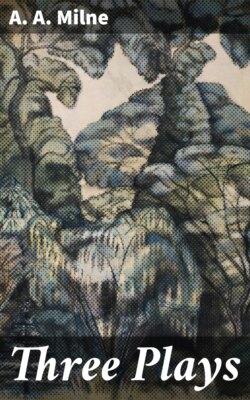Читать книгу Three Plays - A. A. Milne - Страница 5
На сайте Литреса книга снята с продажи.
HAMLET
ОглавлениеTable of Contents
Mr.William Shakespeare, whose well-meaning little costume play Hamlet was given in London for the first time last week, bears a name that is new to us, although we understand, or at least are so assured by the management, that he has a considerable local reputation in Warwickshire as a sonneteer. Why a writer of graceful little sonnets should have the ambition, still less conceive himself to have the ability, to create a tragic play capable of holding the attention of a London audience for three hours, we are unable to imagine. Merely to kill off seven (or was it eight?) of the leading characters in a play is not to write a tragedy. It is not thus that the great master-dramatists have purged our souls with pity and with terror. Mr.Shakespeare, like so many other young writers, mistakes violence for power, and, in his unfortunate lighter moments, buffoonery for humour. The real tragedy of last night was that a writer should so misunderstand and misuse the talent given to him.
For Mr.Shakespeare, one cannot deny, has talent. He has a certain pleasing gift of words. Every now and then a neat line catches the ear, as when Polonius (well played by Mr.Macready Jones) warns his son that “borrowing often loses a man his friends,” or when Hamlet himself refers to death as “a shuffling off of this mortal toil.” But a succession of neat lines does not make a play. We require something more. [xi]Our interest must be held throughout: not by such well-worn stage devices as the appearance of a ghostly apparition, who strikes terror into the hearts only of his fellow-actors; not by comic clowning business at a grave-side; but by the spiritual development of the characters. Mr.Shakespeare’s characters are no more than mouthpieces for his rhythmic musings. We can forgive a Prince of Denmark for soliloquising in blank verse to the extent of fifty lines, recognising this as a legitimate method of giving dignity to a royal pronouncement; but what are we to say of a Captain of Infantry who patly finishes off a broken line with the exact number of syllables necessary to complete the iambus? Have such people any semblance to life at all? Indeed, the whole play gives us the impression of having been written to the order of a manager as a means of displaying this or that “line” which, in the language of the day, he can “do just now.” Soliloquies (unhampered by the presence of rivals) for the popular star, a mad scene for the leading lady (in white), a ghost for the electrician, a duel for the Academy-trained fencers, a scene in dumb-show for the cinema-trained rank-and-file—our author has provided for them all. No doubt there is money in it, and a man must live. But frankly we prefer Mr.Shakespeare as a writer of sonnets.
So much for Mr.Shakespeare. I differ from him (as you were about to say) in that I prefer to see my plays printed, and he obviously preferred to see his acted. People sometimes say to me: “How beautifully [xii]Mary Brown played that part, and wasn’t John Smith’s creation wonderful, and how tremendously grateful you must be.” She did; it was; I am. The more I see of actors and actresses at rehearsals (and it is only at rehearsals of your own plays that you can see them at all, or learn anything of their art), by so much the more do I admire, am I amazed by, their skill. There are heights and depths and breadths and subtleties in acting, still more in producing, of which the casual playgoer, even the regular playgoer if he only sees the stage from the front, knows nothing. But the fact remains that, to the author, the part must always seem better than the player. That great actor John Smith may “create” the part of Yorick, but the author created it first, and created it, to his own vision, every bit as much in flesh and blood as did, later, the actor. You may read the plays here, and say that this or the other character does not “live,” meaning by this that you are unable to visualise him, unable to imagine for yourself, granted the circumstance, a person so acting, so reacting. Well—“If it be so, so it is, you know”; it is very easy not to be a great artist; I have failed. But do not believe that, because a character does not live for you, therefore it does not live for the author. While we are writing, how can we help seeing the fellow? We shut our eyes, and he is there; we open them, and he is there; we dip our pen into the ink-pot, and he is waiting on the edge for us. We shake him out on to the paper.... Ah, but now he is dead, you say. Well, well, he lived a moment before.
[xiii]So when John Smith “creates” the character of Yorick, he creates him in his own image—John Smith-Yorick; a great character, it may be, to those who see him thus for the first time, but lacking something to us who have lived with the other for months. For the other was plain Yorick—and only himself could play him. Alas, poor Yorick, I knew him well, a fellow of most excellent fancy. Would that you could know him too! Well, you may find him in the printed page ... or you may not ... but here only, if anywhere, is he to be found.
A.A.M.
